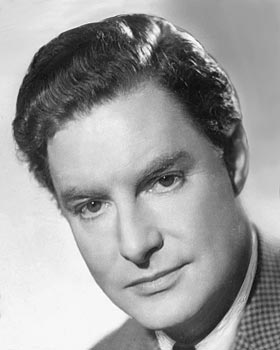Robert Donat (Friedrich Robert Donat)

Initially, around 1930 and 1931, Robert Donat was known as “screen test” Donat in the industry because of his many unsuccessful auditions for film producers.[6] MGM’s producer Irving Thalberg spotted him on the London stage in Precious Bane, and Donat was offered a part in the American studio’s Smilin’ Through (1932). He rejected this offer. Instead, Donat made his film debut in a quota quickie Men of Tomorrow (1932) for Alexander Korda’s London Films. An abysmal screen test for Korda had ended with Donat’s laughter. Reputedly, Korda in response exclaimed: “That’s the most natural laugh I have ever heard in my life. What acting! Put him under contract immediately.” Donat’s first great screen success soon followed in his fourth film. This was as Thomas Culpeper in The Private Life of Henry VIII (1933) for the same producer. Korda loaned him to Edward Small for the only film Robert Donat made in Hollywood, The Count of Monte Cristo (1934). He did not care for the film colony and, despite being offered the lead role in Captain Blood (1935), returned to Britain to begin work on Alfred Hitchcock’s The 39 Steps (1935) opposite Madeline Carroll. His performance was well-received: “Mr Donat, who has never been very well served in the cinema until now, suddenly blossoms out into a romantic comedian of no mean order”, wrote the film critic C. A. Lejeune in The Observer at the time of the film’s release. Lejeune observed that he possessed “an easy confident humour that has always been regarded as the perquisite of the American male star. For the first time on our screen we have the British equivalent of a Clark Gable or a Ronald Colman, playing in a purely national idiom. Mr Donat, himself, I fancy, is hardly conscious of it, which is all to the good.” Hitchcock wanted Donat for the role of the Detective in Sabotage (1936), but this time Korda refused to release him.
In 1936 Robert Donat took on the management of the Queen’s Theatre in Shaftesbury Avenue where he produced Red Night by J. L. Hodson. He made two further films under his contract with Korda, The Ghost Goes West (1935), and Knight Without Armour (1937). Korda became committed to the latter project because of Donat’s indecision. Madeleine Carroll had read the James Hilton novel while shooting The 39 Steps, and had persuaded Donat that it could be a good second film for them to star in together. Donat acquired the rights and passed them on to Korda, although by now Carroll was unavailable. His eventual co-star, Marlene Dietrich, was the source of much attention when she arrived in Britain, in which Donat was involved, and this was enough for him to suffer a nervous collapse a few days into the shooting schedule. Donat entered a nursing home. The production delay caused by Donat’s asthma led to talk of replacing him. Dietrich, contracted by Korda for $450,000, threatened to leave the project if this happened, and production was halted for 2 months. At that point, Donat was able to return to work. In 1938, Donat signed a contract with MGM British for £150,000 with a commitment to making 6 films. In The Citadel (1938), he played Andrew Manson, a newly qualified Scottish doctor, a role for which he received his first Best Actor Oscar nomination.
Robert Donat is best remembered for his role as the school master in Goodbye, Mr. Chips (1939). Australian film critic Brian McFarlane writes: “Class-ridden and sentimental perhaps, it remains extraordinarily touching in his Oscar-winning performance, and it ushers in the Donat of the postwar years.” His rivals for the Best Actor Award were Clark Gable for Gone with the Wind, Laurence Olivier for Wuthering Heights, James Stewart for Mr. Smith Goes to Washington and Mickey Rooney for Babes in Arms. He was a major theatre star. His stage career included performances in Shaw’s The Devil’s Disciple (1938) and Captain Shotover in a new staging of Heartbreak House (1942). With The Cure for Love (1945) by Walter Greenwood, one of the stage productions he directed, he began his professional association with Renée Asherson, later his second wife. This continued with a production of Much Ado About Nothing (1946) with the couple playing Benedict and Beatrice. Donat lobbied hard for two film roles: he was cast in neither. He wanted to play the Chorus in Olivier’s Henry V, but the role went to Leslie Banks, and he longed desperately to be cast against type as Bill Sikes in David Lean’s Oliver Twist (1948), but Lean thought him wrong for the part and cast Robert Newton instead. The MGM British contract ended with litigation, and he made only two more films for the company, The Adventures of Tartu (1943), with Valerie Hobson, and Perfect Strangers (1945) with Deborah Kerr.
Robert Donat died on 9 June 1958 aged 53 in London. His biographer Kenneth Barrow writes on the cause of his death: “Perhaps the asthma had weakened him but, in fact, it was discovered he had a brain tumour the size of a duck egg and cerebral thrombosis was certified as the primary cause of death.” Donat has a star on the Hollywood Walk of Fame for motion pictures at 6420 Hollywood Blvd. A blue plaque commemorates Donat at 8 Meadway in Hampstead Garden Suburb. His place of birth at 42 Everett Road in Withington is also commemorated by a similar plaque. The actors Peter Donat and Richard Donat are his nephews.
Born
- March, 18, 1905
- United Kingdom
- Withington, Lancashire, England
Died
- June, 09, 1958
- United Kingdom
- London, England
Cause of Death
- cerebral thrombosis
Cemetery
- East Finchley Cemetery and Crematorium
- East Finchley, London, England
- United Kingdom



